How the FEIE Standard Deduction influences eligibility for other tax credits
The Foreign Earned Revenue Exemption Explained: A Guide to Enhancing Your Basic Deduction
The Foreign Earned Revenue Exemption (FEIE) is a vital tax obligation provision for U.S. residents and resident aliens living abroad. It enables eligible migrants to exclude a significant part of their foreign-earned earnings from federal taxes. Recognizing the nuances of FEIE can lead to considerable tax financial savings. Many individuals overlook crucial information that might influence their eligibility and advantages. Discovering these facets might expose opportunities for boosted tax outcomes.
Recognizing the Foreign Earned Revenue Exclusion
Lots of expatriates look for possibilities abroad, recognizing the Foreign Earned Income Exemption (FEIE) is important for handling their tax responsibilities. This provision enables united state citizens and resident aliens living overseas to omit a certain quantity of their made income from federal tax. The FEIE was established to relieve the tax obligation concern on people who live outside the United States, acknowledging the one-of-a-kind economic difficulties they might face.

Qualification Demands for FEIE

Exactly how to Assert the FEIE
To effectively assert the Foreign Earned Revenue Exclusion (FEIE), taxpayers should initially verify their qualification based on particular requirements - FEIE Standard Deduction. The procedure involves a number of steps, consisting of submitting the ideal kinds and offering essential documentation. Comprehending these requirements and treatments is important for maximizing tax obligation benefits while living abroad
Qualification Requirements
Eligibility for the Foreign Earned Revenue Exemption (FEIE) rests on meeting certain criteria set by the IRS. To certify, people have to be U.S. people or resident aliens who make income while functioning abroad. They need to develop an international tax obligation home, which suggests their major location of company is outside the United States. Furthermore, candidates have to fulfill either the Authentic House Test or the Physical Presence Examination. The Authentic House Examination calls for that a taxpayer lives in an international country for an entire tax year, while the Physical Existence Examination requires investing at the very least 330 complete days in a foreign country throughout a 12-month period. Fulfilling these demands is vital for declaring the FEIE.
Filing Process Actions
Exactly how can one efficiently browse the procedure of asserting the Foreign Earned Earnings Exemption (FEIE)? People should determine their eligibility based on the physical visibility test or the bona fide home test. When verified, they ought to finish internal revenue service Form 2555, which information foreign earnings and residency. This form should be connected to their yearly income tax return, typically Type 1040. It is necessary to properly report all foreign earned income and warranty conformity with the IRS standards. In addition, taxpayers must preserve proper documents, such as international tax obligation returns and evidence of residency. By complying with these actions, people can efficiently claim the FEIE and potentially minimize their gross income substantially, improving their general financial setting.
Computing Your International Earned Revenue Exclusion
While lots of expatriates look for to maximize their economic advantages abroad, recognizing the calculation of the Foreign Earned Revenue Exemption is important for exact tax obligation reporting. The Foreign Earned Income Exemption enables certifying people to exclude a particular amount of their international earnings from united state taxation, which is adjusted each year for inflation. To calculate this exclusion, expatriates must establish their overall international earned earnings, which typically includes incomes, incomes, and specialist costs gained while living in an international country.
Next, they need to complete internal revenue service Type 2555, supplying information regarding their foreign residency and job status. FEIE Standard Deduction. It is necessary to fulfill either the bona fide home examination or the physical visibility test to get approved for the exemption. As soon as these variables are developed, the optimum allowable exemption quantity is applied, reducing the individual's gross income significantly. Precise computations can cause substantial tax financial savings for migrants living and functioning abroad
The Effect of FEIE on Other Tax Benefits
The Foreign Earned Earnings Exemption (FEIE) can affect an individual's eligibility for sure tax advantages, consisting of the standard reduction. By leaving out foreign earned earnings, taxpayers may discover their adjusted gross revenue affected, which consequently can impact their certification for different tax obligation credit scores. Recognizing these interactions is essential for maximizing tax obligation results while living abroad.
Interaction With Criterion Reduction
When individuals receive the Foreign Earned Revenue Exemption (FEIE), their eligibility for the standard reduction might be impacted, possibly changing their total tax obligation obligation. The FEIE permits taxpayers to leave out view it a specific amount of made income from united state tax, which can bring about a lowered gross income. As a result, if the excluded earnings goes beyond the common deduction, it can diminish the benefit of asserting that reduction. In addition, taxpayers who utilize the FEIE may locate that their capability to make a list of reductions is likewise influenced, as certain costs might be influenced by the exemption. Understanding this communication is necessary for expatriates to optimize their tax advantages while making sure compliance with united state tax regulations
Qualification for Tax Credit Reports
Guiding through the complexities of tax obligation credit histories can be challenging for expatriates, specifically since the Foreign Earned Income Exclusion (FEIE) can significantly affect eligibility for these advantages. The FEIE enables eligible individuals to leave out a significant section of their international profits from united state tax, yet this exclusion can also influence accessibility to numerous tax obligation credits. For example, taxpayers who use the FEIE may locate themselves ineligible for credit ratings like the Earned Income Tax Credit (EITC), as these credit scores typically require gross income. In addition, the exclusion might restrict the ability to claim particular deductions or debts related to dependents. For that reason, comprehending the interaction between the FEIE and available tax obligation credits is essential for migrants intending to optimize their tax obligation situation.
Usual Errors to Avoid When Claiming FEIE
Generally, expatriates experience several mistakes while asserting the Foreign Earned Revenue Exclusion (FEIE), which can result in pricey mistakes or missed chances. One regular mistake is stopping working to meet the physical visibility or authentic house examination, which is vital for qualification. Furthermore, migrants commonly forget the need to file Type 2555 appropriately, causing incomplete or incorrect submissions.
Another usual error includes improperly determining foreign earned income, as several do not account for all pertinent revenue resources. Some migrants mistakenly think they can leave out all their income, uninformed of the restrictions on the exclusion quantity. Additionally, neglecting to keep proper documentation, such as traveling days and residency condition, can threaten a claim. Misconstruing the effects of the FEIE on other tax credit reports may lead to unintended tax obligation obligations. Recognition of these risks can promote his response a smoother declaring procedure and take full advantage of potential advantages.
Resources for Expats Navigating U.S. Taxes
Steering U.S. tax obligation obligations can be testing for migrants, especially after experiencing challenges in asserting the Foreign Earned Revenue Exemption (FEIE) To help browse these intricacies, a range of resources are offered. The IRS website offers considerable info on tax obligation guidelines, frequently asked questions, and forms especially tailored for expatriates. In addition, organizations like the American People Abroad (ACA) and the Expat Tax obligation Professionals deal advice and support to assure compliance with tax obligation laws.
On the internet forums and neighborhoods, such as the Deportee Discussion forum, allow migrants to share experiences and understandings, fostering a helpful environment for those encountering similar difficulties. Tax obligation prep work software Website program, like copyright and H&R Block, frequently consists of functions made for deportees, making the filing procedure a lot more straightforward. Involving with these sources can encourage expatriates to much better understand their tax commitments and optimize advantages like the FEIE.
Regularly Asked Inquiries
Can I Claim FEIE if I'M Freelance Abroad?
Yes, self-employed people abroad can claim the Foreign Earned Income Exclusion (FEIE) To certify, they have to meet particular requirements relating to residency and revenue, guaranteeing they abide by IRS standards for migrants.

Is the FEIE Applicable to Foreign Pensions?
The Foreign Earned Earnings Exclusion (FEIE) is not applicable to foreign pension plans. Pension plans are considered unearned income and do not get approved for the exclusion, which particularly relates to gained earnings from work or self-employment abroad.
What Occurs if I Go Back To the United State Mid-Year?
They may require to readjust their tax obligation situation if a specific returns to the U.S. mid-year. Their eligibility for specific deductions and exclusions, including the Foreign Earned Income Exemption, can be impacted by their residency standing.
Can FEIE Be Claimed With Various Other Deductions?
Yes, the Foreign Earned Income Exclusion (FEIE) can be asserted alongside various other reductions. However, treatment needs to be taken to ensure proper compliance with tax obligation regulations, as specific limitations might use based upon private scenarios.
Just How Does FEIE Impact State Tax Obligations?
The Foreign Earned Earnings Exclusion can decrease a taxpayer's federal income tax obligation obligation, but it does not automatically affect state tax obligation responsibilities, which vary by state and may still require coverage of international revenue.
Lots of expatriates seek possibilities abroad, understanding the Foreign Earned Income Exclusion (FEIE) is vital for handling their tax obligation responsibilities. By omitting foreign earned earnings, taxpayers may find their adjusted gross earnings influenced, which in turn can impact their certification for numerous tax credit scores. Steering with the complexities of tax obligation debts can be challenging for migrants, particularly since the Foreign Earned Earnings Exemption (FEIE) can substantially influence eligibility for these advantages. Taxpayers who utilize the FEIE may discover themselves disqualified for debts like the Earned Earnings Tax Credit (EITC), as these debts commonly call for taxable revenue. Steering United state tax obligation obligations can be challenging for migrants, specifically after encountering mistakes in asserting the Foreign Earned Revenue Exemption (FEIE)